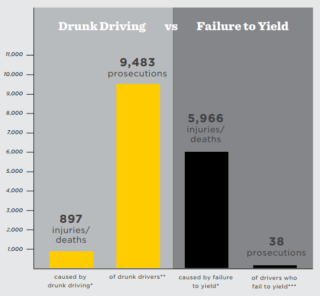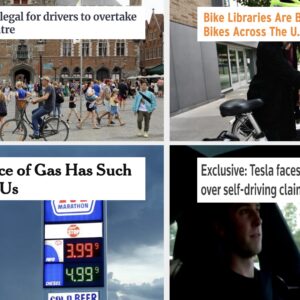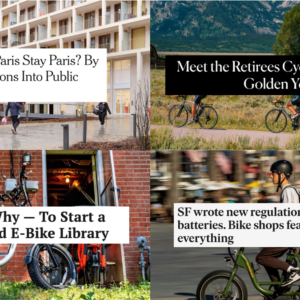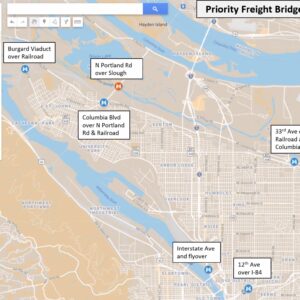This week’s Monday Roundup is sponsored by Lancaster Engineering, a Portland-based traffic engineering and transportation planning firm.
Saturday’s successful finish to the Paris carbon-reduction commitments hovered over a lot of this week’s news, including the bike news. Here are the bike-related links, climatological and otherwise, that caught our eyes this week:
Failure to yield: It causes six times as many traffic injuries as drunk driving (PDF) but is prosecuted 99.6 percent less. (Numbers are from New York state.)
200 miles: That’s what Kurt Searvogel, 52, pedals every single day in his Pop-Tart-fueled campaign to set a world record for distance biked in a year.
Smart car: A Florida woman was arrested for an alleged hit-and-run after her car ratted her out by calling 911 itself.
Cheap oil: Counterintuitively, a big part of the solution to the climate crisis is to keep oil less than $75 a barrel.
Calgary network: Six months after the city opened a downtown protected bike lane grid all at once, bike traffic on the streets has already doubled and 64 percent of Calgarians support the changes.
Vancouver bike lanes: After the failure of a mass transit ballot issue, B.C. business owners and city leaders say that big biking investments are the only viable alternative. They’re planning 12 new bikeways in five years.
San Francisco yield law: The proposed decriminalization of rolling carefully through stop signs on a bike continues to move forward.
Bike tourism: The appeal is spreading, and it comes down to a simple fact: bike tourists spend more money.
Advertisement
Fatality liability: A California city that was ordered to pay $5.8 million to the family of a man killed while biking on a street had not only recently removed a bike lane, it had also rejected a parallel off-street path because it would have run through the city golf course.
Taxi swarm: Dozens of taxis were photographed lining up inside a new protected bike lane in Toronto.
“Dynamic shuttles”: That’s Ford’s phrase for the flexible mass transit system it’s working to develop.
Stuck on gas: As the world’s poor get richer, they’re expected to keep buying gas cars, which is why transportation is the fastest-growing energy-based contributor to global warming.
Auto ban: “Like there is no clean coal, there is no clean car.” So maybe it’s worth remembering that if we wanted to, we could actually ban them.
Pedestrian gradualism: When we plan cities, the sad fact is that “fewer cars don’t necessarily mean more people.” Cities that want to cast off their cars should shrink auto spaces but do so gradually and with care, says one Oslo urbanist.
Beijing crisis: China’s capital shut down factories and forced alternate-day driving in emergency response to a week of smog at “red alert” levels.
Energy reduction: If not for the social and technological changes that followed the 1970s oil shocks, U.S. carbon emissions would be four times higher than they are today. That’s as good of proof as any that we could do it again.
Peace prize: The 2016 Nobel Peace Prize should be awarded to the bicycle, say the hosts of a state-run Italian radio show.
— Michael Andersen, (503) 333-7824 – michael@bikeportland.org








Thanks for reading.
BikePortland has served this community with independent community journalism since 2005. We rely on subscriptions from readers like you to survive. Your financial support is vital in keeping this valuable resource alive and well.
Please subscribe today to strengthen and expand our work.
smart car needs link
These smart/autonomous cars will do things that their operators don’t want them to, like notify emergency responders, come to complete stops, and stay within the speed limit.
Sorry about that, HTML typo. Here’s the link, also added above:
http://www.cnet.com/news/woman-arrested-after-her-car-rats-her-out/
I think people would be surprised to learn how many of the more recent car models already detect crashes. It’s what they do with that information that varies; only some models ‘upsell’ the ability to call 911 as a safety feature. In other systems, auto makers intentionally do not archive information on speed, braking, impact, etc., even though it is sensed in real time. It costs money to create the policies and mechanisms to manage this storage, and to a certain extent there could be transfer of liability. My point, though, is that most modern cars are already ‘smart’ enough to detect and even report collisions, at least to their manufacturers who already record performance and service data remotely.
On a related note – the Driver Privacy Act of 2015:
https://berla.co/the-driver-privacy-act-of-2015
I found a write up here:
http://www.geeky-gadgets.com/woman-leaves-scene-of-accident-car-rats-her-out-08-12-2015/
Good story on the most recent developments with San Francisco supervisors’ proposal to oblige police officers to make stop sign enforcement of people biking, their lowest priority. Story written for the city’s national public radio station by a former SFstreetsblog editor.
The proposal has a chance of moving further forward, though more supervisors are yet to be persuaded. Of one of them, the story reports:
“…Cohen supported a suggestion by Johnson that there be a pilot bike yield program, perhaps along The Wiggle, but ultimately said she could not support the legislation. …” KQED
Six supervisors currently support. Eleven, the full board, are needed to override a possible mayoral veto. Just checked wikipedia for info on the board of supervisors: they represent not just the city, but the entire county as well, by way of a very long standing consolidated city-county government.
Regarding the article on Kurt and the annual mileage record, I’ve been in awe of what Tommy Godwin did in 1939 and have been following Kurt with great interest. To put 75,000 miles in regional riding terms that would be riding Seattle to Portland (STP), then Portland to Seattle (PTS) on alternating days for a year – STP, PTS, STP, PTS, etc. Good work, gentlement.
Just for info: Tommy was unable to straighten his fingers fully for the rest of his life
Clean coal, safe cigarettes, and cars that are either. Make peace or make pretend with these myths.
Re: auto ban – of course, we could “ban” automobiles. However, who is the “we” in this scenario? Well, there is no “we” in the sense of a popular movement that a) believes that global warming, er, climate change is a real danger or threat; b) believes that we need to ban private ownership of automobiles to tend to this climate change fakery (come on, the climate is always changing and when the “experts” no longer have to extend the date of climate doomsday each year out to another 5 years from now, maybe you’ll get some attention); or c) believes that government scientists or technocrats ought to be determining how we live our lives.
It’s interesting how quickly people appeal to the power of the state to ban things in our lives so that the “other people” will be saved. This is the type of tyranny our founding fathers sought to insulate us from with the bill of rights. Our collective liberty is so much morr important that satisfying the tyrannical notiins of do-gooders.
The US is not Finland or Norway or even France. The lessons we can derive frim those countries experiments with transportation are few and far between and this is obvious to anyone who is not interested in abusing state power to regulate every aspect of a citizen’s life.
The irony, of course, is that those people who want to borrow how France does transportation would NEVER borrow France’s approach to search and seizure laws, domestic intrlligence operations, etc., because, France is different. But how we choosr to regulate cars, well, France is the primr good example. Silly, really.
tl;dr – “climate change fakery”
Fatality Liability: should read that a city’s residents have been ordered… That’s who is really paying. The “City” won’t pay anything as it’s not the City’s employees who are coughing up the money.
And what a sad state of affairs in California that a court can order a City to pay because a driver was un- or under-insured and drunk.
The Taxi Swarm article reminds me of the bike lane that goes by the Clackamas Costco. It always has about 10 cars parked in it despite the prominent bike lane sign (picture here):
http://postimg.org/image/qgm39cye5/
Shoppers park in the lane to avoid driving into the large Costco parking lot, despite that lot never being full.
The price of oil is not what matters. What matters is the amount extracted and the amount burned. Essentially all the oil extracted will be burned — these are effectively the same number.
The price of oil can drop because of supply increases or demand decreases. It can rise for the opposite reasons. We need to reduce the supply of and demand for every fossil fuel, each as much as possible. The ratio between supply and demand, which determines market prices, is secondary to the size of each. On the supply side that means banning the dirtiest and most risky extraction methods outright. It means explicitly “banking” known fossil fuel reserves of every kind in the ground. On the demand side it means banning the dirtiest fuels as soon as possible. It means efficiency standards, pollution standards and taxes. It means major support for lower-polluting choices and conversion of infrastructure to support less-polluting energy inputs.
The developed world has an enormous amount of existing infrastructure supporting burning fossil fuels for industry, electricity, home use, agriculture, and transportation. Converting and replacing that infrastructure will take a lot of time, but will be accelerated if we take direct, intentional steps to reduce the fossil-fuel supply!
Today I’m pretty sure oil, gas, and coal are all cheap. Coal because of reduced demand due to regulation, and forecasts for more regulation on the consumption side. Gas and oil because of a glut of supply. One episode of low prices accompanies reductions in production and consumption, and is good for the earth, the other two accompany increases in production and consumption, and are not so good.
I totally agree, but alas, there are so many dimensions to the argument.
Supply and demand don’t always determine pricing in a straightforward manner. Back just a few years ago, the US energy supply was based mostly on coal and diesel, the former of which was expensive due to strict air quality laws, and the latter of which was expensive as it was mainly supplied by overseas vendors who had better control over pricing.
Did we consume less as a result? No, we could still afford not to. But competition (and regulation, as you point out) still drove technological optimization in fuel consumption in cars, trucks, locomotives, and turbines (i.e. “combined-cycle power plant”). Today, these lower production costs are a contributing factor in the prices we pay for heat, energy, driving, flying, and goods – one that’s almost completely overlooked (by media and the public) by the price of a gallon of crude.
What else did we do? We optimized technologies to better find – and extract from – oil and gas reserves. For better AND for worse, we became less dependent on the overseas supply, not just by tapping into local reserves but by shifting technologies: moving from coal to NG for power generation, for instance, and you may see NG-powered locomotives before long. (You’d probably see more NG-powered cars, trucks, and buses if not for the dangers of moving LNG around and lack of fueling infrastructure – not to mention competition with electric and hybrid powertrains).
Oh, and now we’ve got a bunch of coal lying around that the Chinese would gladly pay for, but that’s another story.
Also to consider: not necessarily the price of oil, but why it is becoming cheap. Our ‘improved’ domestic supply (and I use that word loosely in deference to negative environmental impacts) has placed us squarely into an economic war with the Arabs – our frienemies who race us to pump oil out of the ground which will ultimately result in fewer American jobs and higher unemployment in several parts of the US – while we trade in our Priuses (Prii?) for pickups (seriously, look at the shift in auto sales numbers starting a year ago October).
More to the topic of the article: I was a child of that era… yes, I walked for miles uphill both ways in the snow to school. As much as my Dad hated Carter (or anyone else who “leaned left”), he was an obsessive cheapskate who fell right in line with the value of combining errands and optimizing trips by car, keeping the lights off, putting on sweater(s) instead of turning up the heat, pulling the shades down and covering windows with blankets to keep heat in, and even conserving water to keep the bills down. I guess I can now thank the bastard for all that… 🙂
Pete,
I’m curious for your reactions –
Coal lobby chief: COP21 means ‘we will be hated like slave traders’
says Secretary-General of the European Association for Coal and Lignite (Euracoal):
“You might be relieved that the agreement is weak. Don’t be. The words and legal basis no longer matter,” Ricketts told his members. “Fossil fuels are portrayed by the UN as public enemy number one.”
“’Keep it in the ground’ campaigns will morph into campaigns to ‘Put it back in the ground’, watched with growing incredulity,” he predicted.
http://www.euractiv.com/sections/energy/coal-lobby-chief-cop21-means-we-will-be-hated-slave-traders-320424
Interesting the see the EU accused by an industry lobbyist of being influenced by non-profits and protesters – seems the opposite of what goes on here in the states!
I think the train has left the station with coal, as newer gas turbines and alternative energy sources come online – ultimately it boils down to what are the cheapest sources of heat. My understanding is that coal takes more energy to ignite and doesn’t produce as much heat when burning, so it’s just not as attractive as others when it comes to efficiency and thermal recovery. It also has to be conveyed like freight, whereas oil and gas are more easily pumped through pipelines.
Now, that’s thinking from just the business perspective, let alone the environmental…
(Oh, and sorry for the pun-ishment, but you asked for it… 🙂
Is there any way to altert Portland Police to particular areas that have high rates of “Failure to Yield”? I cross Killingsworth at the North I-205 ramp (I-205 bike path) daily. Despite the red light and my crosswalk sign, cars just roll through that turn late, often without a glance to the left. I’ve nearly been hit many times.
One traffic enforcement officer could write a ticket about once or twice per cycle for several hours during both the morning and evening rush hour. However, I’ve never seen one around. Who do I contact?
Seems to be a correlation between highway on/off-ramps and failure to yield. Other trouble spots that come to mind are the I5 off-ramp to east-bound Weidler, and west-bound on-ramp from Skyline to Hwy 26.
And the on-ramp if you’re biking eastbound on Rosa Parks Blvd just east of Interstate. They blow through the lit red turn signal all the time.
It looks like they’ve made efforts at that Rosa Parks on-ramp intersection before: they route people on bikes to the sidewalk, and there are three bike-only signals. It still needs work.
I think that intersection could be improved by moving back the white line that cars are supposed to stop behind so that the drivers are more able to see that there are people riding bikes on the sidewalk to their right. In combination with a sign that alerts drivers to watch out for through bike traffic.
“We’ve seen women riding here, and that’s a great sign because if women are using the facility it’s an indication that it’s safe for everybody, and there’s a lot of research that points to that.” (From the Calgary article). Uh, ok?
soren’s going to have a heart attack:
“Right now, virtually every single electric car—which represent only 0.1 percent of all cars—is still burning fossil fuels. In the US, you are literally shoveling coal into your EV.”
(from the ban cars link)
It’s something all electric car advocates forget…
As much as it painse me…I’m too busy with active transport advocacy to respond to such a ridiculous distortion.
That’s o.k.
“…“Right now, virtually every single electric car—which represent only 0.1 percent of all cars—is still burning fossil fuels. In the US, you are literally shoveling coal into your EV.” (from the ban cars link) watts
Generally true, though solar and wind power also produce some energy that goes into the grid. Despite the energy source, in actual use, it seems to me that electric powered and hybrid powered cars, potentially offer a great improvement to community livability and conditions in traffic.
Unlike most internal combustion engine powered cars, on electric, if the car isn’t moving, the motor doesn’t have to be running, which means, no exhaust. That’s only going to be true though, in mostly fair weather conditions where people aren’t going to need to have the heater or the air conditioner on.
A Prius used down in Arizona, New Mexico or even parts of California, without an air conditioner? Forget it. The same used in any part of the nation where the temperatures drop, will have heaters on a lot of the time. With that consideration though, the hybrid concept is still an improvement over many IC powered cars in production today, because the IC motor in hybrid cars only needs to be big enough to charge the vehicle’s electric motor batteries, which in turn power the relatively small heater and AC systems, rather than having a big 200 hp and larger IC motor, as many motor vehicles today continue to have.
Indeed! NG is also becoming a far more common replacement to coal, and as I mention in a comment above, once again people are ignoring the optimizations that have occurred in power gen – they outpace IC advancements, and more are on the way. The power that charges an electric car can come from blended fuel types and disparate regions, including localized (i.e. PV panels on your workplace or house, or Small Modular nuclear Reactors (SMRs)).
Here in Silly Valley the biggest benefit of electric cars is to reduce the particulate pollution density* that occurs during the now-frequent high pressure systems (that kill the wind and cause ‘spare the air’ alerts). Unfortunately, as I’ve talked about before, most people opt for the less-expensive Prius and then drive it like it’s a Dodge Charger, even though it has a combustion engine that’s not optimized for torque (https://en.wikipedia.org/wiki/Atkinson_cycle).
And you nailed it – I’d rather pedal behind a Tesla than a VW diesel.
*smog 🙂
Not if the owner is charging at home and subscribed to Clean Wind power from PGE.
That is of course the party line, and looked at from the perspective of a single individual who has paid for green kWh, sure. But I think the critique is/has been that this conceptualization doesn’t scale at all. Nor does it account for the inputs, the expected product life of the components, etc. all of which rely inextricably on a fossil fuel drenched industrial base built up over more than a century. There is no magic extrication from that.